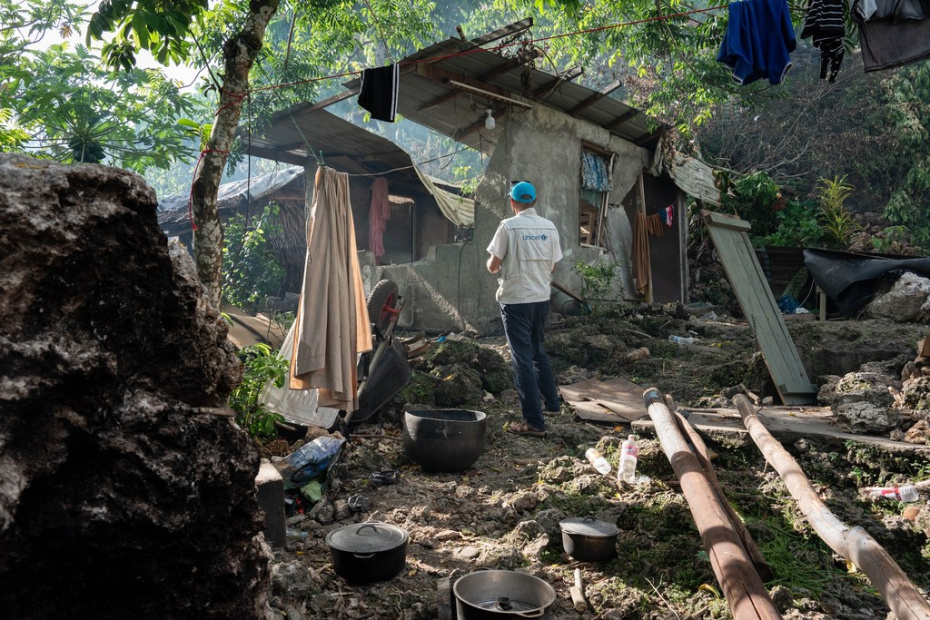UN surge teams mobilise as Vanuatu hit by second earthquake
22 December 2024

UN agencies are intensifying their response in Vanuatu after a 7.3 magnitude earthquake killed 12 people and injured over 200 earlier this week, with a second 6.1 magnitude tremor on Sunday further exacerbating the challenges for affected communities.
A state of emergency remains in effect across the island nation, and a seven-day dusk-to-dawn curfew in parts of Port Vila was scheduled to end on 24 December. Access road to the seaport is also reportedly blocked.
The second earthquake heightened concerns, with further updates on its impact, including on the reopening of Port Vila airport to commercial flights, still awaited.
Humanitarian needs
As of Saturday night (local time), over 80,000 people have been affectedOpens in new window by Tuesday’s earthquake, with nearly 1,700 individuals temporarily displaced. Eleven evacuation centres are sheltering more than 1,200 people, while others are staying with host households.
Immediate needs include access to clean water, food and healthcare, as communities face rising risks of waterborne diseases.
Health services are also reported to be severely strainedOpens in new window, with the Vanuatu Central Hospital (VCH) requiring essential medical supplies and coordinated surge support to address critical gaps.

Source: UNOCHA
Vanuatu earthquake Impact in Shefa province (as of 21 December 2024).
Coordinated response
In response to the escalating crisis, a humanitarian flightOpens in new window coordinated by the UN World Food Programme (WFPOpens in new window)’s Pacific Humanitarian Air Service (PHAS) landed in Port Vila on Saturday, delivering surge teams from UN agencies, huamnitarian partners and relief supplies.
Agencies including the World Health Organization (WHOOpens in new window), the UN Children’s Fund (UNICEFOpens in new window) and the UN Population Fund (UNFPAOpens in new window) are working alongside national authorities to support the responseOpens in new window.
UNFPA has set up maternity tents at VCH, while UNICEF has established four tents to manage patient overflow and deployed child protection teams to support families and healthcare workers.
UNICEF also deliveredOpens in new window bladder water tanks to VCH to ensure continued access to clean water.
WFP has deployed emergency telecommunications specialists to restore disrupted communication networks crucial for coordinating relief efforts. It is also working with the National Disaster Management Office (NDMO) and partners to assess food security needs.
Additionally, the UN Satellite Centre (UNOSAT) is conducting satellite-based damage assessments to guide resource allocation and prioritize affected areas.
Humanitarian partners, including Médecins Sans Frontières (MSF), are also providing on-the-ground assistance alongside national response teams.
Timely response crucial
Alpha Bah, Director for WFP Pacific Multi-Country Office, based in Fiji, underscored the need for timely response for affected families.
“We are saddened by the loss of lives and destruction to property caused by this earthquake. This concerted effort is crucial to ensure that people affected by the earthquake receive timely and essential assistance,” he said.
“WFP is dedicated to supporting the NDMO and other national institutions, and we will continue to step up our efforts to bolster Vanuatu’s response in the face of this crisis.”
Koroi Hawkins, RNZ Pacific editor
@KoroiHawkins koroi.hawkins@rnz.co.nz

A seaside community in Vanuatu holds an open air church service to bring people together. Photo: RNZ Pacific / Koroi Hawkins
Some Vanuatu residents in Port Vila are still too scared to sleep in their own houses as powerful tremors continue to rock the city in the wake of last week's devastating earthquake.
Early on Sunday morning a 6.1 magnitude quake shook many in the capital awake.
The chairman of the seaside community disaster committee, Tom Alick Noel, said some people in their community had erected tents in open spaces to sleep in.
"Some families are still afraid to go back to their homes, so they set up these small tents to sleep in them outside; because we are still feeling strong aftershocks from the big earthquake that struck us last Tuesday," he said.
The president of the Central Ward's council of women, Enneth Fred, said they would stay there as long as the state of emergency remained in place.
Community leaders across the Vanuatu capital are trying to take people's minds off the 7.3 magnitude earthquake.
They have organised daily devotions to bring people together and games and activities for children to try and get them back to just being kids.
Enneth Fred said it was difficult seeing the looks on people's faces after the quake.

Vanuatu Central Ward Council of Women president Enneth Fred. Photo: Supplied
"In my community, especially on women's faces you can see tears, you can see fear, you can see panic attacks and it still haunts them," she said.
She said the community events are about bringing everyone together, so no one feels like they are facing things alone.
Fred was at the top floor of a multi-story building when the quake struck.
"I survived the earthquake and it was a very scary experience and one that I will never forget in my life," she said.
She hoped everyone would learn from the experience.
"I believe it will help us to look at constructing our buildings better in the future so that we can avoid the situation we faced during the earthquake," she said.
The death toll has been updated to 12 in the most recent official report.
Meanwhile, local authorities are urging communities living near landslips and flood-prone areas to relocate to safer ground ahead of several days of stormy weather forecast to start on Monday.
No comments:
Post a Comment